Maintaining supply lines into Afghanistan is key to the success of NATO and U.S. operations in a country where, unlike Iraq, local supplies are extremely limited. This fact was part of the peril caused by the Pakistan government’s recent 11-day closing of the Torkham border crossing at the Khyber Pass .
Images from commercial satellite company DigitalGlobal showed a three-mile-long traffic jam of oil tankers and supply trucks trying to cross the Torkham border pass into Afghanistan. The jam left the trucks vulnerable, and several NATO oil tankers were attacked by militants claiming to be part of Mujahid-e-Islami Buraq, The News International reported.
The pass was closed after a NATO helicopter killed two Pakistani soldiers in September, who allegedly fired their guns to alert the helicopter of their positions. Pakistan reopened the supply line on Oct. 9, following an Oct. 6 apology from U.S. officials .
Two days later, on Oct. 11, The Nation reported that new trade routes will be established along the Pakistani border, following the construction of new checkpoints. An unnamed source told the publication that the intention of the routes is to ensure NATO supplies can get through if other passes are closed in the future.
Pakistan Chief Minister Ameer Haidar Khan Hoti stated the same day that if NATO does not respect Pakistan’s sovereignty in the future, it may face more trouble, Pakistani DAWN Media Group reported.
The present relationship between the United States and Pakistan is not a profound new development, however, but rather the surfacing of ongoing tensions.
For the United States, Pakistan plays a vital role in the war in Afghanistan. “In fact, there is no security relationship in the world today more important than the relationship between the United States military and the military of Pakistan,” House Armed Services Committee Chairman Ike Skelton said in an April 29 hearing.
Images from commercial satellite company DigitalGlobal showed a three-mile-long traffic jam of oil tankers and supply trucks trying to cross the Torkham border pass into Afghanistan. The jam left the trucks vulnerable, and several NATO oil tankers were attacked by militants claiming to be part of Mujahid-e-Islami Buraq, The News International reported.
The pass was closed after a NATO helicopter killed two Pakistani soldiers in September, who allegedly fired their guns to alert the helicopter of their positions. Pakistan reopened the supply line on Oct. 9, following an Oct. 6 apology from U.S. officials .
Two days later, on Oct. 11, The Nation reported that new trade routes will be established along the Pakistani border, following the construction of new checkpoints. An unnamed source told the publication that the intention of the routes is to ensure NATO supplies can get through if other passes are closed in the future.
Pakistan Chief Minister Ameer Haidar Khan Hoti stated the same day that if NATO does not respect Pakistan’s sovereignty in the future, it may face more trouble, Pakistani DAWN Media Group reported.
The present relationship between the United States and Pakistan is not a profound new development, however, but rather the surfacing of ongoing tensions.
For the United States, Pakistan plays a vital role in the war in Afghanistan. “In fact, there is no security relationship in the world today more important than the relationship between the United States military and the military of Pakistan,” House Armed Services Committee Chairman Ike Skelton said in an April 29 hearing.
Skelton said that relations between the two countries must remain solid “if we are to truly serve the interests of both nations.”
Pakistan cannot afford to cut ties with the United States, as they receive $1.5 billion annually through the Enhanced Partnership with Pakistan Act.
The country’s leadership maintains a common line, however, that they prefer the United States and NATO keep their operations off Pakistani soil—a preference that is often undermined by insurgent forces fighting along the borders and operating within the country.
“Al-Qaeda remains in Pakistan where they continue to plot attacks against us and where they and their extremist allies pose a threat to the Pakistani state,” states a Dec. 1, 2009, White House fact sheet, titled “The Way Forward in Afghanistan.” “Our goal in Pakistan will be to ensure that al-Qaeda is defeated and Pakistan remains stable.”
“Our partnership with Pakistan is inextricably linked to our efforts in Afghanistan. To secure our country, we need a strategy that works on both sides of the Afghanistan-Pakistan border,” the document states.
Rising Tensions
Among the more common perceived violations of Pakistan’s airspace are U.S. unmanned drone attacks against militants in the Pakistani border regions. “In its first 18 months, the Obama administration authorized more drone attacks in Pakistan than its predecessor did over two terms,” states a Council on Foreign Relations report from July 19.
The report adds, “In March 2009, Pakistan’s Foreign Ministry declared the strikes ‘a violation of Pakistan’s sovereignty’ that are ‘counterproductive.’”
Pakistani Inter-Services Intelligence “is reported to lend targeting support, and CIA-controlled UCAVs are said to fly from at least one Pakistani airbase,” however, “the U.S. does not appear to notify Islamabad in advance of strikes, for fear of leaks,” states a report from The International Institute for Strategic Studies.
“This leads the Pakistani government to make regular protests against the strike program, criticizing it as counterproductive and damaging to its own hearts-and-minds campaign,” the report states.
Tensions over the drones have been voiced openly by several members of the Pakistan military, who are calling for retaliations.
“Pakistan’s most prominent—and vocal—retired chiefs of the army are demanding that the country’s air force be ordered to shoot down drones and helicopters—and increasingly angry active duty officers are voicing their approval in off-the-record conversations with Pakistani journalists,” states an Atlantic Council report from Oct. 14.
Pakistan retired army chief Gen. Mirza Aslam Beg stated, “We have got the means to avert threats to our security ... and our air force must be ordered to take action against them,” according to the Atlantic Council.
The stance of the Pakistan military remains a key concern of working with the country. Although Pakistan plays a large role in fighting insurgent forces, there is widespread belief that the country’s military intelligence agency, the Inter-Services Intelligence (ISI), is supporting terrorist groups.
A report leaked by a British Defense Ministry think tank in 2006 said the ISI “has been supporting terrorism and extremism—whether in London on 7/7 [the July 2005 attacks on London’s transit system], or in Afghanistan, or Iraq,” according to the Council on Foreign Relations, in a July 26 report.
Similar accusations against the ISI rose in June 2008, over its involvement in a failed assassination attempt against Afghan President Hamid Karzai, and an attack in July 2008, on an Indian Embassy, according to the Council on Foreign Relations.
The United States is likely aware of the ties of the ISI to militant groups, as was suggested by the release of the Wikileaks Afghan War Diary, which contained more than 90,000 classified reports on the war in Afghanistan.
“The documents described ISI’s links to militant groups fighting U.S. and international forces in Afghanistan,” states the Council on Foreign Relations report.
Pakistan has denied the accusations, “citing as evidence its cooperation in the U.S.-led battle against extremists in which it has taken significant losses both politically and on the battlefield,” states the report.
Pakistan’s military-intelligence establishment has lost more than 2,300 soldiers while fighting extremist groups. “Pakistan’s extremists are determined to topple the political system and the deep state. The army is not oblivious to this reality, but it seems unwilling or unable to tackle the real issues at hand,” says an Aug. 24 report from The National Interest.
The report adds that while “the mother of all insurgencies is taking place” in Pakistan’s northwest-frontier region, the Pakistani military “may be losing its hold on vast amounts of territory to the extremists, but it is taking control of Pakistan’s national security and foreign policy away from the government.”
The report adds, “In March 2009, Pakistan’s Foreign Ministry declared the strikes ‘a violation of Pakistan’s sovereignty’ that are ‘counterproductive.’”
Pakistani Inter-Services Intelligence “is reported to lend targeting support, and CIA-controlled UCAVs are said to fly from at least one Pakistani airbase,” however, “the U.S. does not appear to notify Islamabad in advance of strikes, for fear of leaks,” states a report from The International Institute for Strategic Studies.
“This leads the Pakistani government to make regular protests against the strike program, criticizing it as counterproductive and damaging to its own hearts-and-minds campaign,” the report states.
Tensions over the drones have been voiced openly by several members of the Pakistan military, who are calling for retaliations.
“Pakistan’s most prominent—and vocal—retired chiefs of the army are demanding that the country’s air force be ordered to shoot down drones and helicopters—and increasingly angry active duty officers are voicing their approval in off-the-record conversations with Pakistani journalists,” states an Atlantic Council report from Oct. 14.
Pakistan retired army chief Gen. Mirza Aslam Beg stated, “We have got the means to avert threats to our security ... and our air force must be ordered to take action against them,” according to the Atlantic Council.
The stance of the Pakistan military remains a key concern of working with the country. Although Pakistan plays a large role in fighting insurgent forces, there is widespread belief that the country’s military intelligence agency, the Inter-Services Intelligence (ISI), is supporting terrorist groups.
A report leaked by a British Defense Ministry think tank in 2006 said the ISI “has been supporting terrorism and extremism—whether in London on 7/7 [the July 2005 attacks on London’s transit system], or in Afghanistan, or Iraq,” according to the Council on Foreign Relations, in a July 26 report.
Similar accusations against the ISI rose in June 2008, over its involvement in a failed assassination attempt against Afghan President Hamid Karzai, and an attack in July 2008, on an Indian Embassy, according to the Council on Foreign Relations.
The United States is likely aware of the ties of the ISI to militant groups, as was suggested by the release of the Wikileaks Afghan War Diary, which contained more than 90,000 classified reports on the war in Afghanistan.
“The documents described ISI’s links to militant groups fighting U.S. and international forces in Afghanistan,” states the Council on Foreign Relations report.
Pakistan has denied the accusations, “citing as evidence its cooperation in the U.S.-led battle against extremists in which it has taken significant losses both politically and on the battlefield,” states the report.
Pakistan’s military-intelligence establishment has lost more than 2,300 soldiers while fighting extremist groups. “Pakistan’s extremists are determined to topple the political system and the deep state. The army is not oblivious to this reality, but it seems unwilling or unable to tackle the real issues at hand,” says an Aug. 24 report from The National Interest.
The report adds that while “the mother of all insurgencies is taking place” in Pakistan’s northwest-frontier region, the Pakistani military “may be losing its hold on vast amounts of territory to the extremists, but it is taking control of Pakistan’s national security and foreign policy away from the government.”
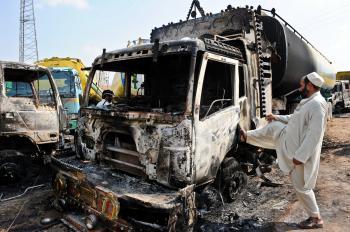

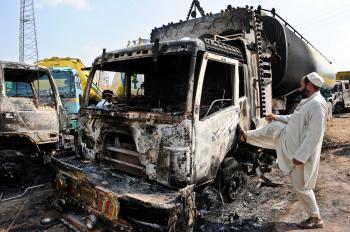
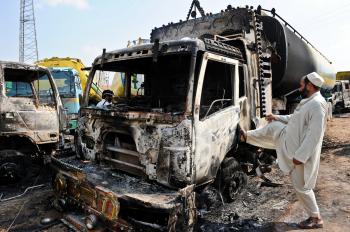


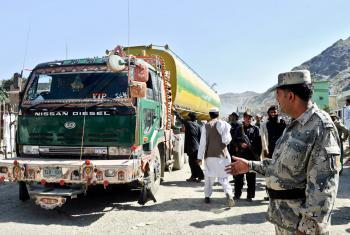
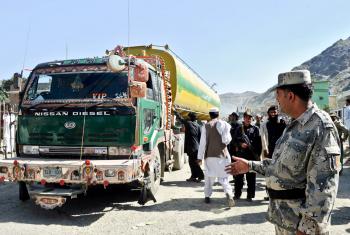
![[LIVE 4/26 at 10:30AM ET] New Push Started for Global Digital Currencies](/_next/image?url=https%3A%2F%2Fimg.theepochtimes.com%2Fassets%2Fuploads%2F2024%2F04%2F19%2Fid5633115-0426-1080x720.jpg&w=1200&q=75)


